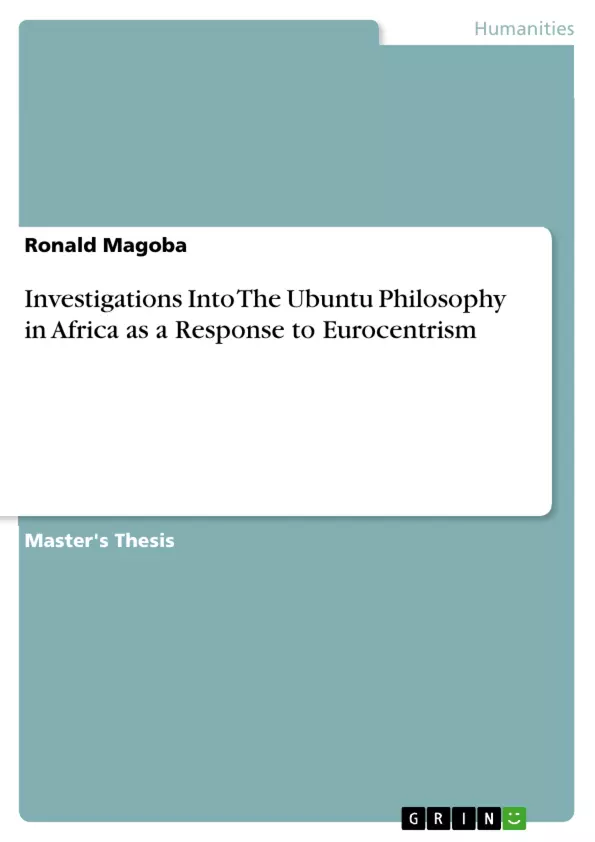In the exploration of philosophical thought, African philosophy stands as a rich tapestry of cultural depth and intellectual inquiry, offering unique insights into the human experience. This thesis delves into the essence of African philosophical thought and its interaction with Eurocentric influences. Against the backdrop of Africa's diverse traditions and histories, this study seeks to understand the role of Ubuntu philosophy in shaping African identity amidst the challenges posed by Eurocentric ideologies.
The introductory sections provide a foundation for the analysis, outlining the dissertation's structure and objectives. Beginning with an overview of African philosophy's tenets, nature, and historical development, the study examines fundamental principles such as the interconnectedness of individuals and communities, the importance of oral traditions, and the influence of societal structures on philosophical discourse.
Subsequent chapters explore contemporary philosophical trends within Africa, highlighting diverse schools of thought that have emerged in response to external influences. From ethnophilosophy to hermeneutics, each school offers unique insights into Africa's philosophical landscape, reflecting the ongoing quest to reclaim indigenous wisdom and challenge Eurocentric hegemony.
Central to the inquiry is an examination of Eurocentrism and its impact on African philosophy. Through an analysis of colonial legacies, racial biases, and epistemological paradigms, the study illuminates the ways in which Eurocentric ideologies have marginalized and distorted African intellectual traditions, setting the stage for a deeper exploration of Ubuntu philosophy as a potential response.
At its core, the study interrogates Ubuntu philosophy and its transformative potential in the face of Eurocentric domination. Drawing on historical accounts, contemporary examples, and comparative analyses, it elucidates Ubuntu's core principles of interconnectedness, compassion, and communal solidarity, highlighting its universal relevance as a philosophy of human dignity and mutual respect.
Inhaltsverzeichnis (Table of Contents)
- GENERAL INTRODUCTION
- 1. AFRICAN PHILOSOPHY: TENETS, NATURE, AND DEVELOPMENT
- 1.0. Introduction
- 1.1. The Definition and Nature of African philosophy
- 1.2. Teachable moments in African philosophy
- 1.3. Philosophers in the African Society
- 1.4. Philosophical pedagogical tools
- 1.5. Conclusion
- 2. COMMON CONTEMPORARY PHILOSOPHICAL TRENDS IN AFRICA
- 2.0. Introduction
- 2.1. Ethnophilosophy School
- 2.2. Nationalistic - Ideological School
- 2.3. Philosophic Sagacity
- 2.4. Professional School
- 2.5. Hermeneutical School
- 2.6. Literary School
- 2.7. Conversational School
- 2.8. Conclusion
- 3. EUROCENTRISM, MANIFESTATIONS AND IMPACT ON AFRICAN PHILOSOPHY
- 3.0. Introduction
- 3.1. Meaning of Eurocentrism
- 3.2. The Legacy of Colonialism
- 3.3. Race and Racism
- 3.4. Misappropriates and Refuting African accomplishments
- 3.5. European Linear Historical Course
- 3.6. Covers Western Oppressive Practices
- 3.7. Religion
- 3.8. Pseudo-Science
- 3.9. European Pedagogy
- 3.10. Conclusion
- 4. UBUNTU PHILOSOPHY AS A RESPONSE TO EUROCENTRISM IN AFRICA
- 4.0. Introduction
- 4.1. Meaning of Ubuntu
- 4.2. A Historical Account of Ubuntu
- 4.3. Desmond Tutu
- 4.4. Nelson Mandela
- 4.5. Michael O. Eze'
- 4.6. Ubuntu Philosophy in the Context of Non-Africans
- 4.7. Contemporary Ubuntu Philosophy
- 4.8. Conclusion
- EVALUATION AND GENERAL CONCLUSION
Zielsetzung und Themenschwerpunkte (Objectives and Key Themes)
This dissertation delves into the Ubuntu Philosophy in Africa, examining its origins, development, and role in countering Eurocentrism. The primary objective is to understand the nature and meaning of Ubuntu philosophy, tracing its historical roots and exploring its contemporary manifestations.
- The nature and meaning of African Philosophy
- Contemporary trends in African Philosophy
- The impact of Eurocentrism on African philosophy
- The meaning of Ubuntu philosophy and its response to Eurocentrism in Africa
- The universality of Ubuntu and its presence in diverse philosophical traditions
Zusammenfassung der Kapitel (Chapter Summaries)
Chapter 1 introduces the tenets, nature, and development of African philosophy, exploring its unique characteristics and how it is transmitted through storytelling, proverbs, and other cultural practices. Chapter 2 examines various contemporary philosophical trends in Africa, including the Ethnophilosophy, Nationalistic-Ideological, and Professional schools. Chapter 3 analyzes the impact of Eurocentrism on African philosophy, highlighting its manifestations in colonialism, racism, and the imposition of Western perspectives. Chapter 4 delves into the Ubuntu Philosophy as a response to Eurocentrism, tracing its historical roots, contemporary applications, and presence in the work of prominent thinkers.
Schlüsselwörter (Keywords)
This work focuses on African philosophy, Ubuntu philosophy, Eurocentrism, colonialism, racism, decolonization, African identity, cultural transmission, philosophical trends, and the universality of human values.
- Quote paper
- Ronald Magoba (Author), 2020, Investigations Into The Ubuntu Philosophy in Africa as a Response to Eurocentrism, Munich, GRIN Verlag, https://www.grin.com/document/1447078



